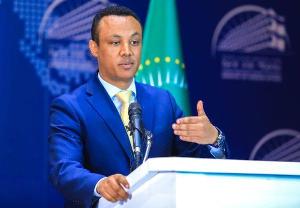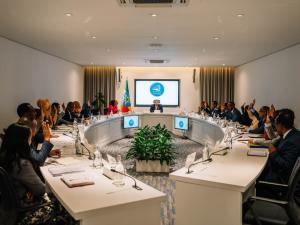Politics - ENA English
Politics
Ethiopia Making Preparations to Host UN Int'l Conference on Financing for Development
Apr 24, 2024 987
Addis Ababa, April 24,2024 (ENA) Ethiopia is making preparations to successfully host the preparatory conference of the 4th UN International Conference on Financing for Development in July 2024, according to Ministry of Foreign Affairs. Foreign Minister Taye Atske Selassie affirmed Ethiopia’s commitment to successfully host the preparatory conference while meeting with UN Deputy Secretary General Amina J Mohammed in Addis Ababa today. The officials exchanged views on the multifaceted partnership and priorities between Ethiopia and the UN. They also deliberated on the status of the SDG implementation, the upcoming UN summit of the future, and recent developments in the Horn of Africa.
Ethio-Djibouti Joint Ministerial Committee Meeting Underway in Djibouti
Apr 24, 2024 982
Addis Ababa, April 24/2024 (ENA) The mid-term review of Ethiopia-Djibouti Joint Ministerial Committee meeting is underway in Djibouti. Transport and Logistics Minister Alemu Sime, Ethiopian Ambassador to Djibouti Birhanu Tsegaye, Djibouti Foreign Minister Mahmoud Ali Youssouf, and Djibouti Infrastructure Minister Hassan Humad Ibrahim are attending the meeting. During the occasion, Transport and Logistics Minister Alemu Sime said the meeting will deliberate and set directions on the issues agreed at the 16th joint committee meeting. According to the Ethiopian Embassy in Djibouti, the meeting is expected to discuss and pass decisions on cooperation frameworks, human trafficking, and border trading.
Expansion of BRICS Opened Opportunities for Strategic Partnerships, Says Foreign Affairs Institute
Apr 24, 2024 1255
Addis Ababa, April 24/2024 (ENA) Inclusion of diversified countries into BRICS has opened great opportunities for strategic partnerships among the member states and peoples in the political, economic and social sectors, according to the Ethiopian Institute of Foreign Affairs. A roundtable meeting on strengthening cooperation between Ethiopian and Russian academic and think tank institutions under the BRICS framework was held in Addis Ababa today. The meeting is in preparation for the upcoming BRICS Academic Forum to be held in Moscow next month, it was learned. Opening the roundtable meeting, Institute of Foreign Affairs Executive Director Jafar Bedru said Ethiopia recognizes the importance of multilateralism and is dedicated to an active participation in the effort to comprehensive reform at architecture of global governance to make it more representatives, inclusive, and diversified. According to him, Ethiopia strongly supports the reform of the UN system and other multilateral institutions in ways that reflect greater representation and inclusion of all countries and regions in the global decision making process. Since its official joining of BRICS in the first of January 2024, Ethiopia has been an active member of the bloc, and the country has been playing an irreplaceable role in creating stable, peaceful and prosperous global community. “The newly expanded BRICS accounts for half of the world's population and the global economy,” the executive director noted. He explained that there have been major achievements in terms of acceding to the major memorandum of understanding, participation in successive BRICS meetings and finalizing the Ethiopian engagement strategy with BRCS plus collective of countries. BRICS Expert Council Head, Victoria Panova of Russia said that many countries have been showing interest to become members of the bloc because it has become so successful and attractive to the rest of the world. There are now 10 member countries, but “we have more than 40 countries that are willing to access to it,” she revealed. BRICS is not about competing, it's about providing for positive agenda, providing for filling the gaps that exist, Panova added. The bloc offers the new model that will be responding to the interest of all the countries of the world majority rather than just a few. According to the council head, today's forum is very important to dicuss issues of cooperation, both horizontal and vertical, between all parts of societies and BRICS countries, which provide for feedback and for new innovative ideas to proceed to the leaders. .
15th Sultan of Afar Arrives in Addis Ababa
Apr 23, 2024 1254
Addis Ababa, April 23/2024 (ENA) The 15th Sultan of Afar, Ahmed Alimirah has arrived in Addis Ababa today. The Sultan was warmly welcomed up on arrival at the Addis Ababa Bole International Airport by high ranking government officials including Deputy Speaker of House of Federation, Zehara humed. Ahmed Alimirah is the son of renowned Sultan Alimirah, who was the spiritual leader of people of Afar. Ahmed Alimirah becomes the 15 Sultan of Afar people last year following the pass away his brother, Hanfare Alimirah. Accordingly, the Sulatan returned home today after staying abroad. The Sultans of Afar people have been hailed for their contribution in resolving social and political challenges through cultural mechanisms.
FM Taye Confers with Personal Envoy of UN Secretary-General For Sudan
Apr 22, 2024 1317
Addis Ababa April 22/2024 (ENA) Ethiopia’s Foreign Minister, Ambassador Taye Atske Selassie had a fruitful discussion with Ramtane Lamamra, Personal Envoy of the United nations Secretary-General Antonio Gutteres for Sudan. The two officials discussed on the importance of a coordinated and harmonized Sudanese-led and Africa-supported peace process to find solutions to the conflict in the Sudan.
Understanding Ethiopia’s Legitimate Interests to Access Sea, Economic Security Imperative: Former U.S. Diplomat
Apr 20, 2024 2304
Addis Ababa, April 20/2024(ENA) It is imperative to understand Ethiopia’s legitimate interests and needs to access the sea and ensure economic security for its people, Peter Pham, a former U.S. Special Envoy for the Sahel and Great Lakes Regions of Africa, said. In an exclusive interview with ENA, the former U.S. Special Envoy said Ethiopia has played a critical role in providing peace and security throughout the region. “It has (therefore) every right to expect in return for that same goodwill and understanding for its legitimate interests and needs within terms of access to the sea and secure economic security for its people. It can't all be a one way street.” Speaking about the MoU signed between Ethiopian Prime Minister Abiy Ahmed and Somaliland President Muse Bihi Abdi, Pham stated that he has been very encouraged by the historic agreement from the very day of the announcement. “Why am I so positive? First and foremost, I believe international relations have to be based upon reality --- not fiction, not fantasy, not wishful thinking but reality. And the reality is the geopolitics and economics of this Horn of Africa region, which is so vital and changing, shifting before our eyes; and we need to adjust to these.” According to him, the second part of the reality is Ethiopia's legitimate interest in having “what I call redundant port structures.” Ethiopia is the world's most populous landlocked state with 120 million people, and to date Djibouti has been providing access for the country. But, he added that a great country with 120 million people should not rely on one outlet. The former U.S. Special Envoy further pointed out that as Ethiopia is looking for access to sea the Berbera Port makes sense economically. “DP World has already invested in there, and the United Kingdom government is investing in phase two. There's a road infrastructure, bringing up the port there.” There is an excellent runway; all sorts of things make that a compelling case, he added. Moreover, Pham elaborated that Africa as a whole and this region in particular lacks critical infrastructure. “I think the key is that Africa as a whole, but this region in lacks critical infrastructure. So I'm very much in favor of anything that contributes to whether ports, roads, energy, electricity. Anything that adds to the stock, that helps create the conditions for economic growth and prosperity shared throughout the region is a positive development.”
EMA Urges Media to Play Leading Role in Nat’l Dialogue, Transitional Justice
Apr 20, 2024 1438
Addis Ababa, April 20/2024(ENA)- The Ethiopian Media Authority (EMA) has called on the media to play a critical role for the success of the historic national dialogue and transitional justice. Ethiopian Media Authority Director-General, Mohammed Idris, told ENA that the national dialogue and transitional justice have huge significance in the protection of human rights and ensuring lasting peace in the country. Realizing national dialogue and transitional justice is vital in building a strong nation, he noted, adding that the active role of all sections of the society will significantly contribute to the success of the processes. In this regard, the mass media have the responsibility of creating a clear understanding among the general public about the issues and refrain from reports that hinder the process, Mohammed underscored. The director-general said that the authority will continue to play its role in providing capacity building training for the media to enable them to cover issues and report ethically. According to him, the national dialogue and transitional justice will define the future of the country and are of great public interest. The media should therefore play their role based on such reality. For Mohammed, the media have crucial role in creating awareness about national dialogue and transitional justice among the public so that they can participate in the process with a spirit of ownership. Recall that the Government of Ethiopia recently reaffirmed its commitment to implementing transitional justice and national dialogue which are essential to ensure lasting peace. Under the leadership of Prime Minister Abiy Ahmed, the Ethiopian government has adopted a comprehensive approach to address the root causes of internal conflicts, paving the way for a more harmonious future.
PM Abiy Vows to Disentangle Ethiopia from Economic Dependence, Make Exemplary in Africa
Apr 20, 2024 1623
Addis Ababa, April 20/2024(ENA)- Prime Minister Abiy Ahmed has vowed to make Ethiopia Africa's Beacon of prosperity and unity by freeing the country from economic dependence. A forum that brought together many people to support the reformist leadership of Ethiopia was held in Wolkite town, Gorage Zone of the Central Ethiopian region, in the presence of Prime Minister Abiy Ahmed. In his message on the occasion, the premier lauded the people of Gurage zone who promote unity and solidarity. He emphasized that this is a practical testament which the rest of Ethiopian people should take as a lesson to live harmoniously. Stressing the need for realizing development and prosperity in Ethiopia, Abiy called on the people of the country to seek peace and harmony in order to see a prosperous and convenient Ethiopia. The prime minister also noted to accommodate Ethiopia’s diverse ethnic identities, cultures, languages, and topography, adding that these could not be a source of difference to build a strong nation-state. Abiy further highlighted that Ethiopia has repeatedly fought for its independence and it is a country that has thwarted all attempts of external aggressions. However, the country has not realized economic development and freed from dependence in this regard. Thus, the East African nation should strive to extricate itself from economic dependence, he said. In this case, Prime Minister Abiy mentioned the success of Gurage people as an example for business and trade activities in Ethiopia. According to him, the people of Gurage’s active engagement in the business sphere, remains a model and would help the endeavors of the nation to free Ethiopia from economic dependence. He also urged all Ethiopians to stand for development and prosperity. The prime minister underscored that the nation has embarked on a massive economic development trajectory to make Ethiopia a beacon of Africa's prosperity. And he called on all Ethiopians to stand together and discharge their national responsibility. Finally, the premier noted that to realize prosperous Ethiopia through strong efforts, it is crucial to consolidate national unity and defeat the illusionist forces, attempting to divide the public and fuel conflict in the country.
Public Rally Held in Wolkite Town in Support of Ongoing Reform
Apr 20, 2024 1452
Addis Ababa, April 20/2024(ENA)- A public rally was held in support of the ongoing multifaceted national reforms in Wolkite town, Central Ethiopia Regional state, in the presence of Prime Minister Abiy Ahmed. High level federal and regional government officials as well as zonal leaders and residents of Wolkite Town, the capital of the Gurage zone, attended the public rally where various messages were conveyed, it was indicated. Similar rallies were held in various regions of Ethiopia during the past few weeks in support of the ongoing reforms. Recall that the Government Communication Service of Ethiopia recently affirmed that vivid results were registered in various spheres over the last six years under the leadership of Prime Minister Abiy Ahmed.
Ambassador Says Armenia Keen to Bolster Relations with Ethiopia
Apr 20, 2024 1894
Addis Ababa, April 20/2024(ENA)- Armenia wants to strengthen bilateral and multilateral relations with Ethiopia, Ambassador Sahak Sargsyan told ENA. The longstanding religious, historical and cultural ties between the two countries are foundations that can help as springboard to catalyze the path to expand bilateral and multilateral relations, the Armenian ambassador to Ethiopia added. The ambassador recalled that Kevork Nalbandian, the musician of Armenian descent, for instance composed Ethiopia’s national anthem, which was in use until 1974. His nephew is also considered a founder of the modern Ethiopian music, particularly jazz and pop, Ambassador Sargsyan revealed. According to him, the countries have already been collaborating in culture, education, and some other fields as well as the IT sector. “But, of course, we look forward to expand this collaboration and partnership with our friends and partners in other areas. That can be tourism, agriculture, and energy.” Moreover, he stated that Armenia likes to strengthen multilateral relations beyond bilateral cooperation. “My objective as an ambassador here is to unlock the potential for collaboration, not only bilaterally but also multilaterally.” Although the historical and strong relationship of the two countries goes back to many centuries, the Armenian Embassy in Ethiopia was opened only four years ago. Yet, it is actively fostering the age-old relationship, he added. Ambassador Sargsyan revealed plans for a documentary film and concert arrangements aimed at solidifying the cultural and artistic ties between the countries. Finally, he pointed out that there were also Armenians who helped Ethiopian fighters acquire modern weaponry during the historical Battle of Adwa.
Horn of Africa Deserves, Can Bring Sustainable Peace, Prosperity: Foreign Affairs State Minister
Apr 19, 2024 1671
Addis Ababa, April 19/2024(ENA)-The Horn of Africa deserves and can bring sustainable peace, prosperity and security to the region, Foreign Affairs State Minister Mesganu Arga said. Opening the Second Horn Dialogue Series today, the state minister said the dialogue series is an important platform to enhance cooperation and collaboration among stakeholders as the Horn of Africa stands at a critical juncture. “Here we have the opportunity to engage in open and intellectual discussions, dissect the regional security landscape and propose concrete strategies for collaboration,” he added. Mesganu stressed that the Horn of Africa deserves sustainable peace, prosperity and security, adding that the dialogue is a crucial step towards achieving that vision. He believes that nations can address the root cause of conflict and foster sustainable peace by fostering greater collaboration between themselves. “We can strengthen our collective effort to counter terrorism, piracy and illicit arms threat by implementing effective border management, and maritime security protocols. We can also create a safer and more stable environment for all.” This region, which is a strategic gateway to Africa, the Middle East, and Asia, holds immense significance for peace, stability, and prosperity. However, “we cannot ignore the harsh reality of the Horn region burdened by complex security challenges, armed conflict, political instability, recurrent drought induced by climate change, piracy and proliferation of smaller arms and traffic,” he stressed. The governments should, therefore, work together with unwavering commitment and a shared sense of purpose to build a brighter future for the Horn of Africa and in turn for the entire international community. And this dialogue is a crucial step towards achieving that vision, the state minister noted. Institute of Foreign Affairs Executive Director, Jafar Bedru, said on his part that the Horn of Africa has recently become a critical region due to a convergence of events and circumstances. Thus, this round of dialogue series seeks to raise awareness and influence policy directions for navigating the region's complexities, he said, adding that open regional dialogues is very crucial for addressing current challenges and envisioning a shared future for the Horn of Africa. “By leveraging the collective strengths, resources and aspirations of its member countries, the region can achieve security, economic prosperity and social development. This requires fostering greater cooperation, collaboration and dialogue.” The executive director underlined that this requires fostering greater cooperation, collaboration and dialogue. According to him, the Horn Africa holds immense potential for regional integrity, integration and prosperity despite the challenges. Panelists and participants discussed thematic issues, including changes and continuities in the regional security landscape, the role of external actors in regional security, building a stronger, integrated region for sustainable peace and opportunity. The aim of the Second Horn Dialogue Series held today in Addis Ababa is to foster knowledge sharing, idea exchange and exploration of innovative solutions for the region's pressing security and political challenges.
UNSC Does Not in Any way Reflect Global South, Africa: AU Political, Peace & Security Commissioner
Apr 19, 2024 1484
Addis Ababa, April 19/2024(ENA)-The current UN Security Council (UNSC) does not in anyway reflect the Global South and Africa, which constitutes over 20 percent of the UN member states, AU Political Affairs, Peace & Security Commissioner Bankole Adeoye said. Ethiopia has been pushing for Africa to have permanent seats at the UN Security Council on several occasions including at AU summits. For Instance during the 35th Ordinary Session of the African Union (AU) Prime Minister Abiy Abiy Ahmed underscored that Africans deserve permanent seats at the UNSC. "This is particularly through of the United Nations. We as Africans lack representation in the Security Council and are underrepresented in a variety of ways. It is the right time to reform and revitalize the United Nations system to reflect current global realities and ensure that a more representative body with only fair representation and transparency in those institutions can usher in a just era in multilateralism, " the premier stressed. A roundtable discussion was recently held in Addis Ababa to discuss about how to achieve a reform at the UNSC where diplomatic corps based in the capital participated. During the discussion, Commissioner Adeoye pointed out that the world remembers Africa when they need its solidarity in the UN General Assembly, and it is battling with its own challenges. However, Africa is a formidable force that could potentially be strongly united, resilient and influential, he stated, and stressed that “54 member states in the UN system that is already over 20 percent that can be a force to reckon with, but we are not at the table.” Adeoye added that Africa is not at the most important round-table that speaks about peace and security in the world. “Multilateralism cannot be what we see in the current composition of the UNSC. It is not inclusive, equitable, representative, democratic; and it is not in anyway reflecting the Global South. It does not reflect Africa as we want. So, we want a united, resilient Africa that would promote the sustainable development goals but also lead to the next level,” the Commissioner stressed. The negotiations and process and reform package of the UNSC reform has been going on for decades, Ambassador Bakole stated. According to him, promoting global identity and shared values are crucial to achieve the reform which currently are missing in the UNSC. Adeoye underscored that “there is no way we are going to have a council that is reformed and does not speak to the shared values of all UN member states as humanity.” Also, the veto is not democratic, he pointed out, and noted “I can imagine in our national systems, intergovernmental institutions there is nowhere that veto is exercised recklessly, consistently, and without restrain.” But in this case, autocracy at national level is condemned while veto system is put in place at international level that blocks reasonable and most efficient use for international diplomacy. “What the AU is saying is that we want to be a strong united influential player in the international system; and that means that we must use all the arrows we have to make sure we bring peace and stability to our continent and to the world and effectively.” Finally, Adeoye underlined that Africa wants the UN to reform its council “because our issues will be reflected based on what we believe are globally shared values, shared experiences and lessons, and the action that comes with whichever process.”
Ethiopia Reiterates Commitment to regional Peace, Development
Apr 19, 2024 1671
Addis Ababa,April 19/2024(ENA)- Ethiopia, an anchor nation in the restive Horn of Africa region, has remained committed to playing a constructive role in peace and development, Foreign Affairs State Minister Mesganu Arga told ENA. In his exclusive interview that covered a wide ranging diplomatic and regional issues, the state minister noted that Ethiopia is a major player for stability and development endeavors in the Horn of African region. “The Horn of Africa is a turbulent region where Ethiopia’s role in terms of peace and development has been one of the key areas the country has been contributing to the regional peace and stability. Ethiopia has played a constructive role in Somalia, South Sudan, and Sudan.” He further stated that Ethiopia is contributing its fair share to global collective diplomatic engagements and regional partnership. According to Mesganu, the country's foreign policy is anchored on the major pillars such as strengthening partnership with neighboring countries and economic integration. In particular, the current foreign policy stresses sustained economic growth by achieving joint regional development and peace. So, “the focus is largely on promoting peace, stability, development and mutual interest in the sub-region, Africa, and the global community,” the state minister elaborated. Speaking on the changing dynamics in the region and beyond, Mesganu said that promoting peace is a key area that Ethiopia has been collaboratively working with the international community and the neighboring countries. In this respect, he acknowledged that the current geopolitical developments are affecting the greater Red Sea area, Middle East, and the globe at large. And as Ethiopia is part of the global community and close to the areas it is affected by this phenomenon, Misganu stated, adding that it has therefore been promoting partnership with the international community based on principled foreign policy. “Actually, Ethiopia’s traditional position is promoting collective global security. That is a key focus of our foreign policy. Thus, securing the Horn of Africa and the Red Sea is the core vital national interest of Ethiopia. And we will continue to do so in partnership with the global community in terms of securing the region, fighting terrorism and fighting against piracy in this part of the region.” The state minister pointed out that Ethiopia has a core vital interest in the peace and security of the Red Sea. “The Red Sea is our outlet for our global commercial activity.” For him, the east African region has a common destiny and thus the need for reinforcing mutual developments. “We have to grow together and our interests are intertwined. Our destiny is connected. So promoting peace, development, and economic integration is Ethiopia’s core vital interests. (Therefore) we promote friendship, and we promote mutual benefits with the neighboring countries.”
Implementing Transitional Justice Instrumental to Realize Lasting Peace: House Speaker
Apr 19, 2024 1072
Addis Ababa April 19/2024 (ENA) -Implementing a participatory transitional justice policy is essential to realize lasting peace and for the better future of Ethiopia, Speaker of the House of People's Representatives Tagesse Chaffo said. Ethiopia has been making various attempts to resolve human rights violations, civil conflicts, unwarranted narratives and abuses that had occurred and continue in different eras with a wide range of victims and perpetrators. However, these approaches have not yet brought about the desired lasting solution to the country as they were not implemented in a manner of universal transitional justice based on truth, reconciliation, mercy and justice and guided by a clear policy in an inclusive, human rights-oriented and flexible way. In order to further strengthen these efforts, the Council of Ministers has approved Transitional Justice Policy this week. A consultative meeting for parliamentarians and higher government officials on the federal administrative procedure law and transitional justice policy is being underway in Addis Ababa. Opening the consultative meeting, Speaker of the House noted that implementing transitional justice policy is essential for the better future of Ethiopia. Designing and implementing a transitional justice which is participatory, and based on the nation's political and social circumstances and managing it with clear policy framework is vital, he underscored. Regarding the significance of the federal administrative procedure law, the speaker said that administrative procedure is the cornerstone of social justice. Noting that the Ministry of Justice has huge role for the monitoring and coordinating the implementation of the policy and law documents, the speaker affirmed that the HPR will continue it's unwavering support. Minister of Justice Gedion Timothewos on his part stressed that implementing the transitional justice policy is critical for ensuring lasting peace and will be vital in the transition to building a better democratic system. Higher government officials from various justice institutions and parliamentarians and pertinent stakeholders attended the consultative meeting.
Second Horn Dialogue Series Underway in Addis
Apr 19, 2024 1186
Addis Ababa April 19/2024 (ENA) The 2nd Horn Dialogue Series which aimed at discussing pressing regional affairs is underway in Addis Ababa today. The dialogue series is being held under theme "Navigating the complexities: fostering regional security in the Horn of Africa." State Minister of Foreign Affairs, Mesganu Arga, scholars, international experts, diplomats, other invited guests are participating at the event.
Nat’l Dialogue Commission Accomplishes Various Preliminary Preparations
Apr 18, 2024 1172
Addis Ababa April 18/2024 (ENA) The National Dialogue Commission has accomplished various preliminary preparations and identification of participants in various regions, city administrations, Chief Commissioner Professor Mesfin Araya revealed. The Chief Commissioner of the National Dialogue Commission said that preliminary accomplishments have been made in identifying participants in the various regions and city administrations across the country. Speaker of the House of Peoples Representatives, Tagesse Chaffo, on his part remarked that all supportive initiatives that are offered to the coordinated activities of the Commission will help to promote national development endeavors and enable us to leave our hand prints on the process. Four months performance report of the commission was reviewed by higher officials of the House and concerned stakeholders. On the occasion, the Speaker who presided over the review session lauded the performance made by the Commission in accomplishing its tasks in greater accountability to discharge its responsibilities by overcoming various challenges to ensure sustainable peace in the country. The Speaker remarked that it is important to proactively perform tasks through collectively coordinated efforts among government structures in cooperation with security forces. He added that more concerted efforts need to be made with all stakeholders who can contribute to the smooth performance of the Commission’s tasks. Ethiopia’s National Dialogue Commission Chief Commissioner, Professor Mesfin Araya added that various activities have been conducted in identifying potential participants on the national dialogue at the regions and city administrations across the country. He pointed out that tasks related to collecting agenda at the regional levels and related activities have been conducted by charting out various means and ways in cooperation with concerned stakeholders. The Commissioner further noted that the identification of participants in regions that have not been reached will be conducted through public meetings to identify possible agenda and potential participants. He called upon all concerned to pull together efforts to facilitate better political platform to contribute their part in the whole process of the dialogue. The meeting was attended by government whips, members of the Permanent Committee for Democratic Affairs, higher officials of the HPR, ministers, commissioners, heads of media houses and other officials who forwarded their opinions on the content of the report.
Finland Committed to Supporting Ethiopia's National Dialogue
Apr 18, 2024 1117
Addis Ababa April 18/2024 (ENA) State Minister of Foreign Affairs Ambassador Mesganu Arga met with Suldaan Said Ahmed, Special Envoy of Finland for Peace Mediation to the Horn of Africa and discussed ways of enhancing bilateral cooperation between Ethiopia and Finland. On the occasion, both officials emphasized the importance of strengthening ties in various areas including agriculture technology and education, according to Foreign Affairs Ministry. Ambassador Mesganu highlighted Ethiopia's commitment to continue a positive regional role for regional peace and stability. The state Minister assured that the government of Ethiopia is committed to fully implement the Pretoria peace agreement. Special envoy Suldaan Said, acknowledged Ethiopia's role in the peace and stability of the Horn of Africa underscoring Finland’s commitment to supporting Ethiopia's national dialogue process. The two officials exchanged views on a range of bilateral, regional, and global issues, reaffirming their mutual dedication to fostering stronger diplomatic relations.
Ethiopia, Norway Vow to Consolidate Bilateral Relations
Apr 18, 2024 1108
Addis Ababa April 18/2024 (ENA) Ethiopia and Norway have reiterated commitment to further consolidate the bilateral ties, according to the Ministry of Foreign Affairs. State Minister of Foreign Affairs Mesganu Arga conferred with Norwegian Ambassador to Ethiopia, Stian Christensen on ways of deepening the relationship between the two countries. The two sides thoroughly held discussion to strengthen cooperation between Ethiopia and Norway in development cooperation, sustainable peace building, climate change prevention, water resource management and the use of transboundary resources. State Minister of Foreign Affairs Mesganu Arga stated that Norway is a long-standing partner of Ethiopia. The state minister further stressed the need for heightening this relationship to a better level. He requested that Norway's development cooperation with Ethiopia continue to be strengthened. Mesganu expressed Ethiopia’s determination to strengthen the relationship with Norway in the areas of water resource utilization and climate change prevention. On his part, Norwegian Ambassador to Ethiopia, Stian Christensen reaffirmed his country’s commitment to consolidate its relationship with Ethiopia in all spheres.
Ethiopia Spearheads Africa's Push for Permanent Seat at UN Security Council
Apr 18, 2024 1020
Addis Ababa, April 18/2024 (ENA) Ethiopia is one of the leading countries that are raising voices for Africa to have a permanent seat at the UN Security Council by strengthening its participation in the multilateral institutions of which it is a founder, Foreign Affairs Spokesperson remarked. Spokesperson of the Ministry, Nebiyu Tedla made the remark in his biweekly press briefing today. The briefing focused on the achievements in foreign relations and diplomacy carried out the last six years and planned diplomatic activities this week. He said that Ethiopia is one of the leading countries that are raising voices for Africa to have a permanent seat in the Security Council by strengthening its participation in the multilateral institutions of which it is a founder. The current UNSC does not reflect the Global South and Africa, which constitutes over 20 percent of the UN member states. Ushering in economic reforms, opening up fields that were closed to foreign companies and most importantly, the work done to ensure food sovereignty as an example were mentioned at the briefing. He detailed the diplomatic achievement made for Ethiopia to become a BRICS member and said that the national effort to create a climate resilient economy has been done to gain international recognition with the help of green diplomacy. Nebiyu stated that by signing the Pretoria Peace Agreement and adhering to it, Ethiopia has also proven its strong desire for peace through its tireless efforts to solve African problems within an African framework.
Council of Ministers Approves Transitional Justice Policy
Apr 17, 2024 1530
Addis Ababa, April 17/2024 (ENA) The Council of Ministers has approved the draft Transitional Justice Policy today. According to a statement issued by the council, the approved policy will be effective as of its date of approval. Ethiopia has made various attempts to resolve human rights violations, civil conflicts, unwarranted narratives and abuses that had occurred and continue in different eras with a wide range of victims and perpetrators, the statement added. However, these approaches have not yet brought about the desired lasting solution as they were not implemented in a manner of universal transitional justice based on truth, reconciliation, mercy and justice and guided by a clear policy in an inclusive, human rights-oriented and flexible way. A draft policy unanimously approved was submitted to the Council of Ministers to manage and implement the transitional justice process in an organized, integrated and effective manner at the national level, it was learned. Additionally, the council has deliberated on federal civil servants draft bill. The draft bill was presented at the 29th regular session of the Council of Ministers to enable the implementation of the policy based on the approved Public Service Delivery and Administration Policy. It is also expected to be instrumental in resolving the gaps in the implementation process of the draft decree that was approved in 2010, the statement explained. In particular, the draft bill has been prepared to establish a system that could fit with the times and solve the problems witnessed in realizing a free, independent, efficient, accessible and accountable administration. The council discussed the draft decree in detail and unanimously referred it to the House of People's Representative for approval.

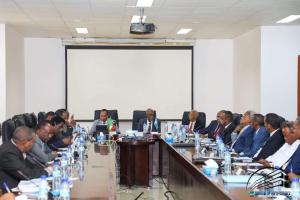

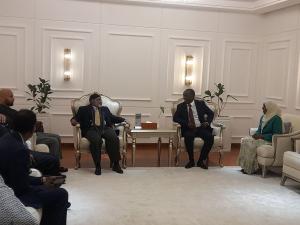
.jpg)
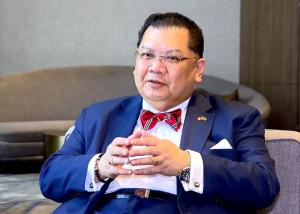

.jpg)
.jpg)
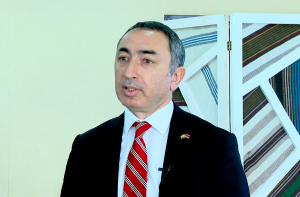
.jpg)
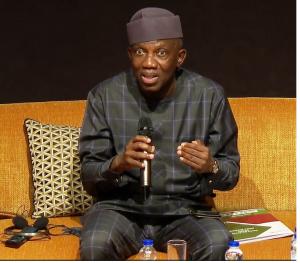

.jpg)
.jpg)
.jpg)
.jpg)
.jpg)
